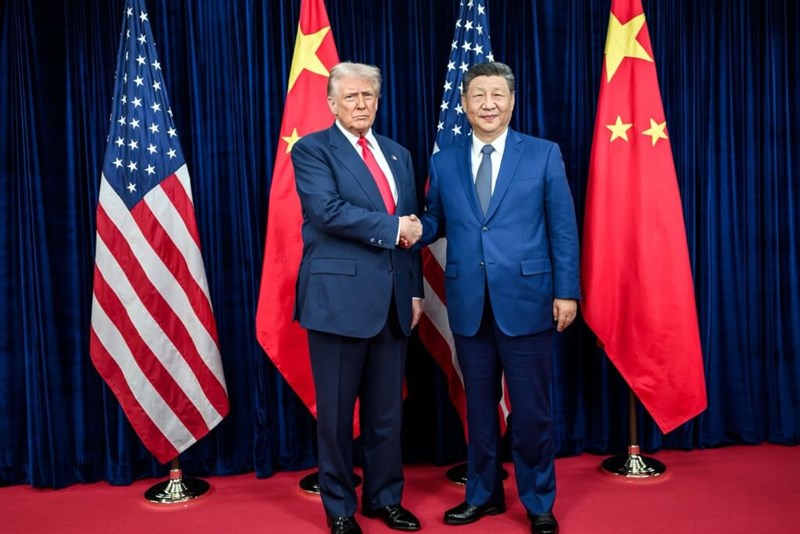
Washington/Taipei, Oct. 31 (CNA) The absence of any discussion about Taiwan during a meeting Thursday between U.S. President Donald Trump and Chinese President Xi Jinping (習近平) drew different interpretations, but analysts generally saw it as good news for Taiwan.
Trump and Xi met in Busan, South Korea, on Trump's final stop in East Asia during his first trip to the region in his second term. The meeting lasted only about 100 minutes -- much shorter than expected -- but Trump said "I think the meeting was a 12" on a scale from 0 to 10.
When asked by reporters whether Taiwan was discussed, Trump said the issue "never came up." Instead, the two leaders announced a one-year trade truce, with the United States agreeing to reduce tariffs on Chinese imports to 47 percent, down 10 percentage points.
In a video interview with CNA, Dennis Wilder, former director for China at the U.S. National Security Council, said the outcome was "a very good thing for Taiwan" and suggested two possible scenarios: either Washington made clear that Taiwan would not be discussed or Beijing decided not to raise the issue.
Under the first scenario, Wilder said, China understood Washington's stance and saw no point in broaching the topic.
Under the second, given Trump's habit of revealing meeting details, Beijing might have refrained to avoid having Trump later claim that "the Chinese asked for concessions and he didn't give them," Wilder said.
Kurt Tong, managing partner at The Asia Group, called Taiwan's omission "a bit of a surprise," noting that the People's Republic of China (PRC) typically brings up the issue at high-level meetings to signal its unyielding position.
Tong speculated that the meeting's packed schedule might have left no time for the topic. While acknowledging Trump's sometimes transactional remarks about Taiwan, he said such comments were "usually made in the context of complaining about some other aspect of the U.S.-Taiwan relationship."
Speaking separately, Richard Bush, a nonresident senior fellow at the Brookings Institution's Center for East Asia Policy Studies, and Chang Wu-ueh (張五岳), an associate professor at Tamkang University's Center for Cross-Strait Relations, said Taiwan's absence from the talks likely indicated that it was not among the most urgent issues for China.
Bush said that once translation time was factored in, the two leaders may have had only about 50 minutes for substantive exchanges, and the Chinese side did not appear to have a sense of urgency regarding the Taiwan issue.
Chang said in Taipei that trade and technology issues between the U.S. and China were more urgent for the two powers.
Meanwhile, Peter Cowhey, an international trade expert and former senior counselor to the U.S. Trade Representative, told CNA that Washington may have deliberately avoided mentioning Taiwan as part of a strategy to decouple the issue from trade negotiations, signaling a more cautious U.S. stance.
The Busan meeting capped Trump's Asia tour, which included a visit to a U.S. military base in Yokosuka, Japan, and his approval of South Korea's plan to build nuclear submarines in the U.S.
Wilder said those moves were aligned with Trump's principle of "peace through strength in the Pacific."
"All of this strengthens the alliance structure in East Asia, and that is to Taiwan's benefit," he said.
Trump and Xi are scheduled to meet again in April 2026 in China, with Xi possibly paying a visit to the United States sometime after that.
-
Society
Taiwan headline news
02/19/2026 02:28 PM -
Politics
Ex-recruits look back as alternative diplomatic service phased out
02/19/2026 12:27 PM -
Society
Agricultural research station in Tainan introduces new sesame variety
02/19/2026 12:13 PM -
Society
Taipei restaurant ordered to close after diners fall ill
02/18/2026 11:25 PM -
Politics
Lai congratulates Takaichi on reelection as Japan PM
02/18/2026 10:09 PM